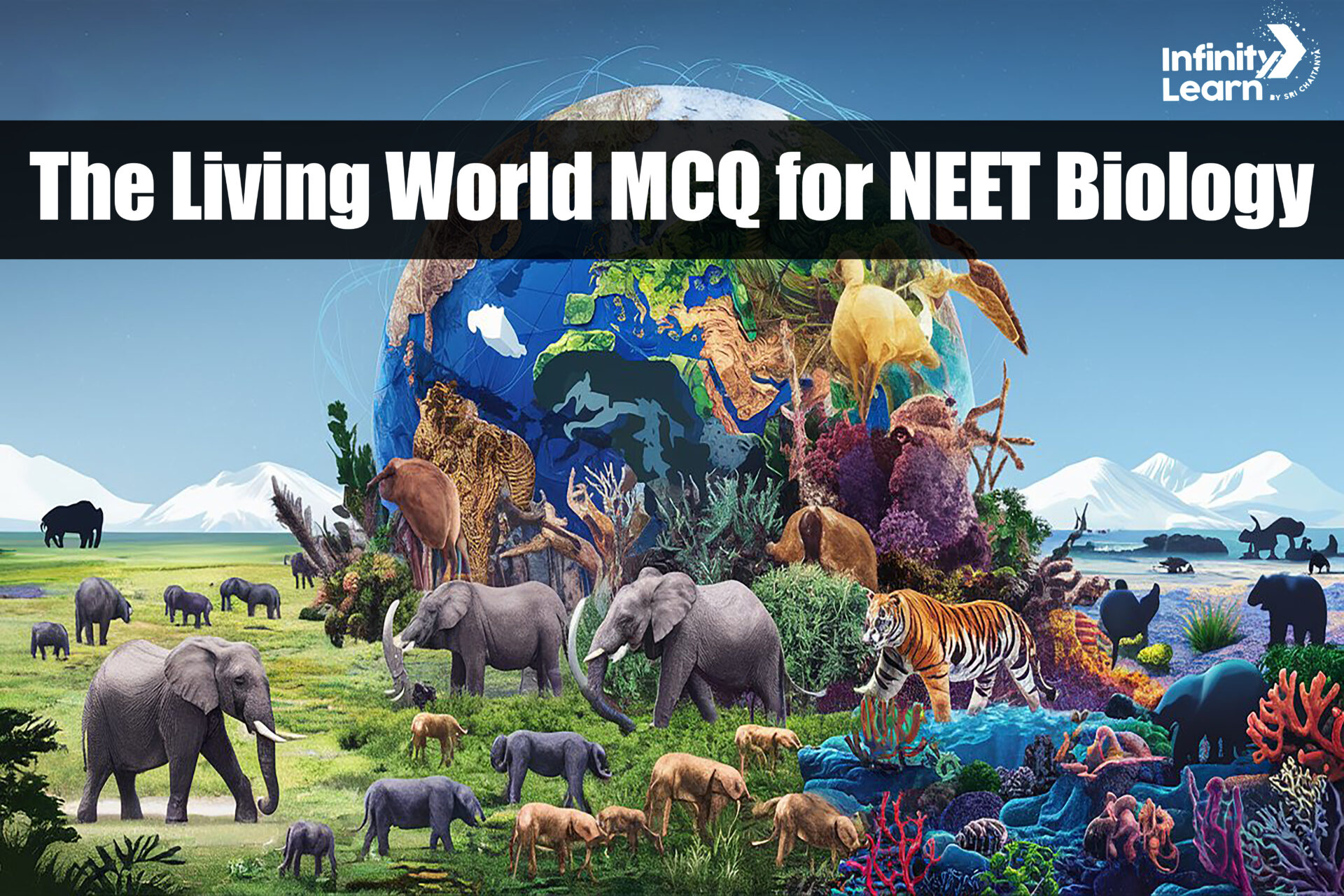Table of Contents
The Living World MCQ for NEET: The Living World MCQ for NEET are essential for students preparing for the NEET exam. These multiple-choice questions encompass a wide range of topics within the living world, offering a thorough examination of essential concepts. Engaging with these NEET MCQs helps students grasp complex biological principles, enhance their problem-solving skills, and build confidence. By practicing The Living World MCQ for NEET, aspirants can effectively assess their understanding and improve their readiness for the exam.

The Living World NEET Questions
The Living World is a critical topic for NEET exam preparation, encompassing classification, characteristics, and evolution of living organisms, as well as taxonomy, biodiversity, and ecological relationships. Understanding these subjects is crucial for addressing issues related to food chains and conservation. Gaining a thorough comprehension of The Living World not only helps students pass the NEET exam but also provides a strong foundation for understanding more complex biological concepts. Online tests that offer multiple-choice questions on various aspects of the living world, including taxonomy, biodiversity, and ecological relationships, can be helpful resources for students preparing for the NEET exam. These tests enable students to evaluate their understanding of key concepts and identify areas that require improvement.
The Living World MCQ for NEET with Answers
1. What is not considered a domain of life according to the given options?
A) Bacteria
B) Archaea
C) Eukarya
D) Protista
Answer: D) Protista
2. Who is known for creating the system of binomial nomenclature?
A) Charles Darwin
B) Carl Linnaeus
C) Louis Pasteur
D) Gregor Mendel
Answer: B) Carl Linnaeus
3. Among the following options, which represents the highest rank in biological classification?
A) Kingdom
B) Phylum
C) Class
D) Order
Answer: A) Kingdom
4. In the binomial nomenclature system, which part of the name represents the genus?
A) The first part
B) The second part
C) Both parts
D) Neither part
Answer: A) The first part
5. Which of the following is a characteristic of prokaryotic cells?
A) Membrane-bound organelles
B) Nucleus
C) Ribosomes
D) Endoplasmic reticulum
Answer: C) Ribosomes
6. Which kingdom comprises organisms capable of photosynthesis and possesses cell walls made of cellulose?
A) Monera
B) Protista
C) Fungi
D) Plantae
Answer: D) Plantae
7. What is the primary purpose of the phylogenetic tree?
A) To show evolutionary relationships among organisms
B) To classify organisms into kingdoms
C) To determine the age of fossils
D) To illustrate the food chain
Answer: A) To show evolutionary relationships among organisms
8. What defining feature distinguishes the kingdom Fungi?
A) Ability to perform photosynthesis
B) Cell walls made of chitin
C) Motility using cilia
D) Presence of chlorophyll
Answer: B) Cell walls made of chitin
9. In which domain would you categorize an organism that survives in extremely harsh environments like hot springs?
A) Bacteria
B) Archaea
C) Eukarya
D) Protista
Answer: B) Archaea
10. What term refers to the classification of organisms based on their evolutionary relationships?
A) Taxonomy
B) Phylogeny
C) Morphology
D) Ecology
Answer: B) Phylogeny
11. Which of the following is NOT a part of the five-kingdom classification system?
A) Monera
B) Protista
C) Animalia
D) Bacteria
Answer: D) Bacteria
The Living World MCQ for NEET 2024
12. What distinguishes eukaryotic cells from prokaryotic cells?
A) Presence of a cell wall
B) Presence of a nucleus
C) Presence of ribosomes
D) Presence of plasma membrane
Answer: B) Presence of a nucleus
13. Which kingdom includes organisms that are primarily decomposers?
markdown
Copy code
A) Plantae
B) Animalia
C) Fungi
D) Protista
Answer: C) Fungi
14. In the classification hierarchy, which level comes immediately after Order?
A) Family
B) Class
C) Phylum
D) Genus
Answer: A) Family
15. What is the key characteristic of viruses?
A) Cellular structure
B) Ability to reproduce independently
C) Genetic material surrounded by a protein coat
D) Presence of mitochondria
Answer: C) Genetic material surrounded by a protein coat
16. How is the process of grouping organisms based on their similarities and differences referred to?
A) Cladistics
B) Phylogeny
C) Taxonomy
D) Ecology
Answer: C) Taxonomy
17. What distinguishes the kingdom Monera from others?
A) Presence of membrane-bound organelles
B) Presence of a nucleus
C) Lack of a true nucleus
D) Presence of chlorophyll
Answer: C) Lack of a true nucleus
18. What is the primary tool used for identifying and naming new species of organisms?
A) Phylogenetic analysis
B) Binomial nomenclature
C) Cladistic analysis
D) Genetic sequencing
Answer: B) Binomial nomenclature
19. Which kingdom consists of single-celled organisms that have a nucleus but do not have cell walls?
A) Plantae
B) Animalia
C) Fungi
D) Protista
Answer: D) Protista
20. What type of symmetry is found in organisms that can be split into mirrored halves along only one plane?
A) Radial symmetry
B) Bilateral symmetry
C) Asymmetry
D) Spherical symmetry
Answer: B) Bilateral symmetry








